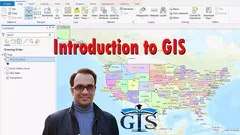
Machine Learning in GIS and Remote Sensing: 5 Courses in 1 
Combine GIS and machine learning in our specialized course, and harness AI for geospatial insights. #MachineLearning #GIS #AI ▼
ADVERTISEMENT
Course Feature
![]() Cost:
Cost:
Paid
![]() Provider:
Provider:
Udemy
![]() Certificate:
Certificate:
Paid Certification
![]() Language:
Language:
English
![]() Start Date:
Start Date:
2022-11-11
Course Overview
❗The content presented here is sourced directly from Udemy platform. For comprehensive course details, including enrollment information, simply click on the 'Go to class' link on our website.
Updated in [August 21st, 2023]
What skills and knowledge will you acquire during this course?
By taking this course, you will acquire the skills and knowledge to:
1. Understand the theoretical concepts of Machine Learning and Deep Learning in the context of Geographic Information Systems (GIS) and Remote Sensing.
2. Apply Machine Learning and Deep Learning algorithms, such as Random Forest, Support Vector Machines, Decision Trees, and Convolutional Neural Networks, for geospatial analysis tasks in QGIS and ArcGIS.
3. Perform land use and land cover mapping (classifications) and object-based image analysis (segmentation, object detection) using Machine Learning and Deep Learning techniques.
4. Conduct regression modeling for GIS tasks in ArcGIS.
5. Utilize open source tools like QGIS and market-leading software like ArcGIS for geospatial analysis.
6. Gain proficiency in QGIS for spatial data analysis and explore the capabilities of ArcMap and ArcGIS PRO.
7. Familiarize yourself with the Orfeo Toolbox for advanced processing in GIS.
8. Complete two independent GIS projects to practice and apply Machine Learning and Deep Learning analysis in QGIS and ArcGIS.
9. Enhance your GIS and Remote Sensing skills in a demonstrable and easy-to-follow manner.
10. Gain practical experience in creating maps based on Machine Learning algorithms using QGIS and ArcGIS software tools.
Overall, this course will equip you with the necessary skills and knowledge to confidently apply Machine Learning and Deep Learning techniques in GIS and Remote Sensing, making you proficient in advanced geospatial analysis tasks and providing you with cutting-edge geospatial methods.
How does this course contribute to professional growth?
This course contributes to professional growth by equipping individuals with theoretical and practical knowledge of Machine Learning and Deep Learning in QGIS and ArcGIS for geospatial analysis. It enables individuals to confidently apply Machine and Deep Learning algorithms for various Remote Sensing and GIS tasks, such as land use and land cover mapping, object-based image analysis, and regression modeling. The course also prepares individuals to use both open source (QGIS) and market-leading (ArcGIS) software tools, expanding their skillset and making them proficient in spatial data analysis. By completing practical exercises and independent GIS projects, individuals gain hands-on experience and the ability to implement cutting-edge geospatial methods. This course is particularly beneficial for professionals in fields such as geography, programming, social science, geology, and GIS & Remote Sensing, who need to use maps in their work and want to enhance their GIS skills with Machine Learning techniques.
Is this course suitable for preparing further education?
Yes, this course is suitable for preparing further education.
Course Syllabus
Introduction
Software used in this course: QGIS and ArcGIS 10.6 and ArcGIS Pro
On Machine Learning in GIS and Remote Sensing: theoretical background
Unsupervided Learning in ArcGIS
Unsupervided Learning in QGIS
Supervised Machine Learning for LULC Classification in ArcGIS
Supervised Machine Learning in QGIS
Image Segmentation in GIS
Object-based Image classification with Machine Learning algorithms in ArcGIS
Regression modelling in GIS
Getting started with Deep learning in ArcGIS Pro
Hands-on: Deep Learning in ArcGIS Pro
Make it real: Implement your own Machine Learning Project
Course Provider

Provider Udemy's Stats at AZClass
Discussion and Reviews
0.0 (Based on 0 reviews)
Explore Similar Online Courses

Geospatial Data Science with Python: GeoPandas

Species Distribution Models with GIS & Machine Learning in R

Python for Informatics: Exploring Information

Social Network Analysis

Introduction to Systematic Review and Meta-Analysis

The Analytics Edge

DCO042 - Python For Informatics

Causal Diagrams: Draw Your Assumptions Before Your Conclusions

Whole genome sequencing of bacterial genomes - tools and applications

Introduction to GIS

Enterprise Geodatabases & Data Pipelines


Start your review of Machine Learning in GIS and Remote Sensing: 5 Courses in 1